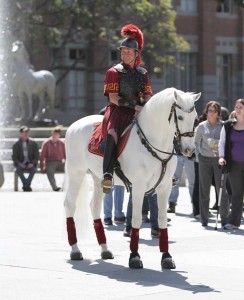Panel discusses state of education system
Experts in education discussed the underlying problems facing K-12 education around the country and how students could get involved with solving them to kick off Program Board’s Education Month on Monday in Bovard Auditorium.
Organizers hope EdMonth, a two-weeklong event series, will make students more aware of educational disparities and spark similar events at other universities.

Education · Traveler and his rider, Hector Aguilar, appeared Monday at the EdMonth Opening on Trousdale Parkway. Wendy Kopp, CEO of Teach For America, spoke at a kickoff event at Bovard Auditorium Monday evening. - Corey Marquetti | Daily Trojan
Los Angeles Mayor Antonio Villaraigosa delivered opening remarks. He said students in Los Angeles K-12 public schools face an array of problems that could be solved by increasing accountability of teachers, raising the standards for teaching credentials and increasing wages.
“If we want to compete in the world, we have to have the best public schools in the world,” Villaraigosa said. “If we want to compete in the world, we have to have the highest standards for our teachers.”
The panelists said underperforming teachers have created underperforming students and decreasing graduation rates, which led to the U.S. falling behind other leading countries of the world in terms of education.
“Other countries have gotten this, they do whatever they can to get the best teachers into schools for everyone and that makes a difference,” said Karen Gallagher, dean of the Rossier School of Education. “We don’t do that, and that is one of the things that we can control.”
Wendy Kopp, CEO and founder of Teach for America, stressed that there is no perfect model for a school, but improving education requires administrators who can get parents, students and teachers to work together.
“There is no magic,” Kopp said. “This is about a leader and a team that embrace a mission.”
Gallagher said this concept can be applied in different ways. USC Hybrid High, a charter school for chronically truant students scheduled to open in fall, will have teachers working 40 hours a week, but not at traditional hours, allowing students to attend school while working or caring for family members.
“We want to bring in parents,” Gallagher said. “We want to bring in community members.”
The panelists stressed that USC students can help without pursuing a career in education by mentoring younger students or getting involved with the Joint Educational Partnership.
Eddie Souler, a freshman majoring in civil engineering, said the call to action made the event unique for him.
“Everyone was really into the whole reform idea,” Souler said. “Not just giving us information but pushing toward things.”
Markus Mar-Liu, a freshman majoring in astronautical engineering, said the panel could have included more information about fixing systemic problems in education.
“It had a really good selection of people with great experiences,” Mar-Liu said. “It would’ve been better if they talked about the solution more than the problem.”
Latino/a Student Assembly Executive Director Steven Almazan, one of the event organizers, said he hoped the panel helped “offer insight into how students right now can make a difference.”
Moderator David Belasco, a professor of business, said the panel of education experts addressed an important issue.
“Education reform is probably the largest issue of our time,” Belasco said. “It’s fundamentally unfair. It shouldn’t matter who your parents are or where you were born, everyone should have a shot at education.”
Los Angeles Unified School District Board President Mónica García said education must be equal for people to find success.
“We know education changes lives. We know education is the great equalizer,” García said. “It is not okay for the U.S. to be 16th in graduation rates.”
Marshall Tuck, CEO of the Partnership for Los Angeles Schools, Villaraigosa’s initiative to help underperforming schools, said the city’s education disparity demonstrates the effect of inequality.
“If you are born in a certain part of Los Angeles, you have a huge mountain to climb,” Tuck said.
Some students said the panelists broke down a complex issue.
“The panel really got to touch on various issues,” said Ruth Le, a junior majoring in public policy, managing and planning. “[The organizers] brought together a lot of dynamic people who had a lot to say.”

Let’s remember not to put full blame on the “underperforming” teachers for the disparities in LAUSD; The district is, as always, proposing to cut even more funding